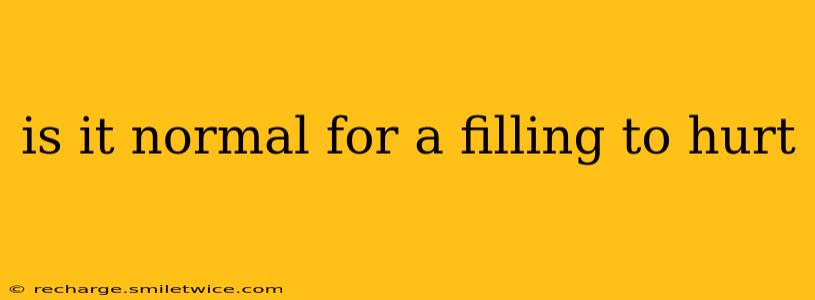It's perfectly understandable to wonder if post-filling discomfort is normal. Dental fillings, while generally a straightforward procedure, can sometimes cause some degree of pain or sensitivity. Whether this pain is "normal" depends on several factors, including the type of filling, the extent of the cavity, and your individual pain tolerance. Let's delve into the nuances of post-filling pain and what you should expect.
What Causes Post-Filling Pain or Sensitivity?
Several factors can contribute to discomfort after a filling:
- Irritation of the tooth: The process of preparing the tooth for a filling involves removing decayed material, which can temporarily irritate the underlying dentin (the layer beneath the enamel). This irritation can lead to sensitivity, especially to hot, cold, sweet, or acidic foods and drinks.
- Inflammation: Some minor inflammation is normal after any dental procedure. This inflammation can cause mild pain or pressure.
- High filling: If the filling is placed too high, it can interfere with your bite, leading to discomfort or pain.
- Infection: While less common, an infection can occur if bacteria enter the tooth during the filling procedure. This would cause more significant and persistent pain.
- Sinus infection: Upper molars are close to the sinuses. Pain after a filling in this area might be misconstrued as tooth pain when in fact it is a sinus infection.
- Jaw muscle strain: Sometimes, the process of keeping your mouth open during the procedure can strain the jaw muscles, causing post-procedure discomfort.
How Long Does Post-Filling Pain Usually Last?
Generally, any sensitivity or mild pain associated with a filling should subside within a few days to a couple of weeks. If the discomfort is severe or persists for longer than two weeks, it's crucial to contact your dentist.
What Type of Pain Should I Be Concerned About?
While mild, temporary sensitivity is common, certain types of pain warrant immediate attention:
- Sharp, throbbing pain: This could indicate an infection or other complication.
- Severe pain that doesn't respond to over-the-counter pain relievers: This needs professional evaluation.
- Pain accompanied by swelling or fever: These are signs of a more serious issue.
- Persistent pain lasting more than two weeks: This indicates a potential problem with the filling or the underlying tooth.
Is It Normal to Have Sensitivity to Hot and Cold After a Filling?
Yes, temporary sensitivity to hot and cold is a fairly common experience after getting a filling. This usually stems from the irritation of the dentin and subsides as the tooth heals. However, if this sensitivity is intense or persists for an extended period, consult your dentist.
When Should I Call My Dentist After a Filling?
You should contact your dentist if you experience:
- Severe or persistent pain
- Swelling or inflammation
- Fever
- Difficulty chewing or biting
- A noticeable change in the bite
How Can I Manage Post-Filling Discomfort?
Over-the-counter pain relievers like ibuprofen or acetaminophen can help manage mild pain and inflammation. You can also try rinsing your mouth with warm salt water to help keep the area clean and reduce inflammation. Avoid chewing on the affected side until the discomfort subsides.
Remember, this information is for general knowledge and should not substitute professional dental advice. Always consult your dentist for any concerns about your dental health. They can properly assess the situation and provide the best course of action.
